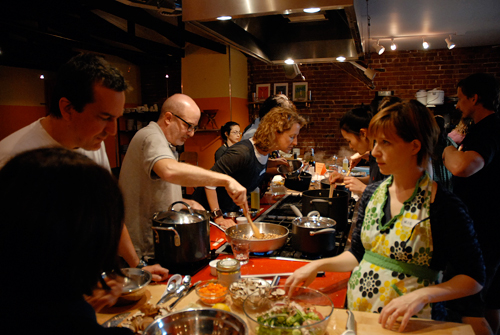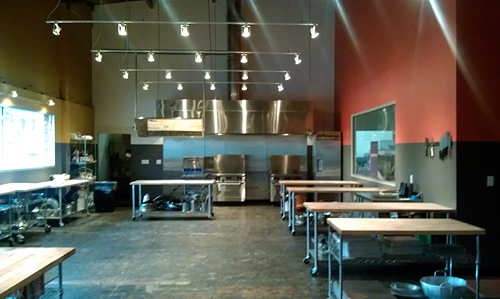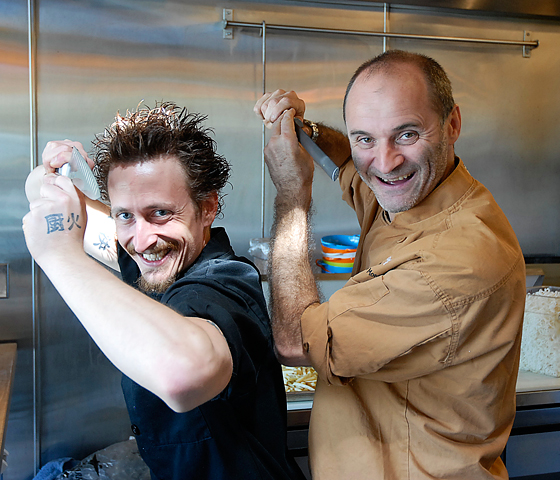(Word to the recession weary: The kitchen is currently not accepting any new culinary assistants, which has proven a popular way for cash-strapped wannabe cooks to hone their skills. In exchange for helping prep before classes and clean up after, culinary assistants attend for free.)
In addition to showing off their new digs, serving food, and talking up the school's calendar of classes, MikeC and Said will sign copies of their recent book, Kitchen on Fire: Mastering the Art of Cooking in 12 Weeks (or Less), a step-by-step, technique-driven tome designed to offer new skills for the complete novice to the accomplished home cook.

Kitchen on Fire plans to offer longer classes at their new satellite site.
BAB checked in with Chef MikeC to find out what's cooking at the new Kitchen on Fire location.
Why did you decide to open a second Kitchen on Fire site and what drew you to this location?
Our classes were filling up so quickly (and many had large wait lists) so we needed more space to handle the demand. Our new location offers close access to the freeway, Berkeley Bowl West is in walking distance, and it's attached to a restaurant and home chef retail store, Rocket Restaurant Resource. Those three things made it a perfect match for us.
How has the continuing economic downturn and renewed interest in the D.I.Y. Domestic Arts impacted your business?
Oddly enough we have thrived through the recession. More people seem to think learning to cook is a great idea right now, whether to save money, eat healthier, change career, or just for the love of food. People want to come into the kitchen and create enticing, delicious, nourishing experiences at home for family and friends.
How is the new location different from the Gourmet Ghetto site?
It is a larger facility with two kitchens. It is also a blend of home chef and restaurant cooking equipment, so we can offer classes for both the home and professional chef.
What can folks look forward to at the new school in terms of classes, instructors, and events?
We will offer longer (four or more hours compared to our typical three-hour) classes, as well as more series-style classes on both cooking techniques and ethnic cuisines, including Thai, Indian, and French. We're also working with an ever-growing roster of guest chef instructors that are experts in their cuisines. On the event side, we can now hold larger private and corporate parties.
What's unique about your cooking school?
We are one of only a few independent (not part of a retail, grocery, cooking appliance) cooking schools in the country that has a focus on teaching home chefs. We have a vibrant atmosphere, with expert instructors who engaging. We explain the inner workings of food and its cookery to help students become confident cooks.
We're also involved in community outreach programs with non-profit partners such as Three Squares and St. Vincent de Paul's Kitchen of Champions. We help teach people living on welfare how to feed their families healthy meals on limited budgets or learn cooking skills they can use to find work in the food service industry.
What are the fundamental cooking techniques a novice should learn first?
Knife skills: If the food isn’t cut to the proper (and uniform) shape and size, it won’t cook evenly. Sautéing and stir frying would be next. Both are quick and easy techniques to make a meal and also the first step for many other techniques, such as making a soup or stew.
If you had to name three dishes that every home chef should know how to prepare, what would they be?
A roasted chicken and vegetables, veggie stir fry, and frittata.

A sneak peek inside the new Kitchen on Fire culinary classroom.
Details:
Kitchen on Fire West Grand Opening
Saturday, January 28, 7 p.m.-9 p.m.
Address: Map
(Inside Rocket Restaurant Resource)
2940 7th Street, Berkeley (between Potter St. and Anthony St.)
510-548-2665


